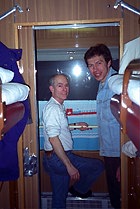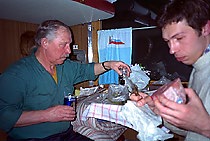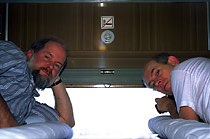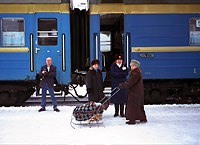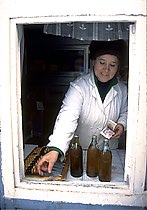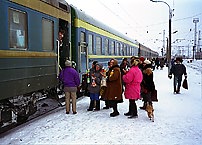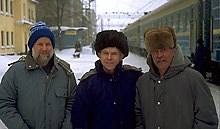Go to Chapter 4At 64, Maxime had never before spoken to an American and now he found himself sharing a sleeping compartment with two Americans and Sergei, our interpreter, on a 24 hour train ride to Perm, on the Urals, one of the easternmost cities of Europe, two time zones east of Moscow. Maxime was returning to his home city of Perm for the first time in eight years to see his brother, sister, daughter and son. There will be a great family reunion with much food and plenty of drinking and dancing. Maxime was clearly excited. His old gray suit, odd in style to Americans, hung carefully so it would not be wrinkled.
Any awkwardness between Maxime and us, soon disappeared. Russian beers in oddly irregular colored bottles smoothed the way. Shortly after departure, venders, all women, walked the corridors selling chocolates, coffee, soc (a popular, generic fruit juice), beer, cigarettes, and nice souvenirs and gifts such as cut crystal from their husband's factories (or finished at home in "cottage industries.")

Ed and I were interested in sets of glass goblets (ryumka) although 45,000 rubles seemed a bit pricey. A bit of thinking.... The vender came down in price -- two sets for 80,000 rubles. More thinking... When she said she'd write "God Bless You" on the boxes, we were sold! Would two sets be enough? Maxime smiled. The wisdom of age showed in his eyes. He worried out loud that at this rate we would have all of our money spent before we got to Perm...
At around 6 PM Maxime opened his dinner and Sergei brought out our dinner. We combined all of the food and shared. Maxime had two parcels wrapped in wet newspaper strips. One contained boiled eggs and the other baked chicken. He also produced a round loaf of bread. Sergei brought four pounds(!) of corned beef, a waxed paper bag of pickles, white cheese wrapped in newspaper and more bread.
Like most older Russians, Maxime's life has been a mixture of good times and a persistent sadness. He was a young boy during the Great Patriotic War (WW II). He and his sister and brother liked to peel potatoes so that they could eat the peels as a little extra. His father died before he was born. Maxime quit school in the 5th grade to go to work at a factory that produced barges and ships for the Navy. He finished school at night. The naval ships were produced in Perm because it was so far east that it was relatively safe from the advancing Germans. The ships were constructed, tested, and then cut apart and floated down the Cama and Volga Rivers to the Black Sea. Our train is named for the Cama River.
The sleeping compartment is especially clean. There are four bunks, a little table and ample storage in the 6 x 5 sq. ft. space.
A large window affords a view of passing villages, forests, farmland, all frozen and covered with heavy snow. A new red carpet with gold, black and white decorative trim covers the corridor and sleeping compartment floors. A linen runner protects the carpet and is replaced periodically. Russian passengers take off their shoes and walk about in bedroom slippers and sweat pants.
Each train car has a provodnik (conductor.) Ours is a 40 year old woman named Marina and she has a pleasant disposition. She checks our passports, serves us tea and coffee, sells lottery tickets, vacuums the carpets, replaces the linen runners and during stops, knocks the snow and ice from the underside of our train car.
We can get off the train for 15-20 minutes at each stop. Venders, mostly older women and young boys, meet the train selling pastries, freshly boiled potatoes, salted and dried fish, sausages, bread, Eskimo pies, bottled domestic milk, preserves...

(Ten years ago, these venders would sell local produce to the passengers and then buy sausages from the train's dining car.)
Maxime is now retired. In addition to seeing his family, he hopes to visit the old factory where he once worked. He worries about people his age or older. The rapid changes to a market economy are very difficult for pensioners. Many older people have had to go back to work selling goods on the streets in order to survive. Maxime has a skill and is doing well. He recently made five million rubles ($900) installing water-circulating heating systems in two dachas (summer cottages built near cities.) This is more than four times the average Russian monthly salary. Maxime worries about the youth of today. They start hustling goods on the streets at age 14 and make more money than their teachers. He thinks their teachers no longer serve as an example to the youth. People work two or more jobs. Community spirit is dying. A soccer field that the men in his neighborhood once built now stands empty, overgrown with tall grass in the summer. Everyone worries about money. Vodka is cheaper than beer or bottled water... Maxime is glad he is not young and starting out in this scary world of the new Russia.
The sleeping compartment is hot. Its very late. A distant radio plays a mixture of British, American and Russian music. When the DJ likes a song he claps after it is over. People are reading in their beds. The trains rocks back and forth along the tracks. Its too hot to sleep. Stark, frozen Russian countryside passes by in the darkness. I wish I could open the window just a little bit. Da-svee-dan-ya.
PS. Five days later, when returning to Moscow, Maxime looked for us. He remembered we would be in Car 5 and he was in Car 11. We embraced like old friends.
Back to the Table of Contents

